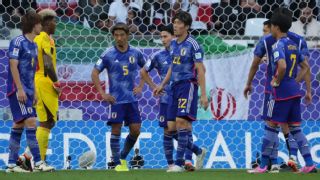|
After a four-month hiatus, the second round of Asian qualifiers for the 2026 FIFA World Cup is back with two sets of matches to take place on Thursday and next Tuesday. It is shaping up to be a pivotal round of fixtures with only two more match days to go in this stage of qualification after the coming games. The qualifiers also double up as a means to reach the 2027 AFC Asian Cup, with the top two teams from the six groups advancing automatically while also staying alive in the hunt for a World Cup berth. Meanwhile, the two lower-ranked teams in each group will be out of the running for the World Cup but will then progress to the third round of qualifying for the Asian Cup. Here, we take a look at five things to look out for ahead of Thursday's games. Powerhouses look to bounce back from Asian Cup disappointment  While the Asian qualifiers have been on hiatus since last November, it did not necessarily mean inactivity for many teams -- given there was the not-so-small matter of the Asian Cup at the start of the year. While it was Qatar who ultimately emerged triumphant, many continental heavyweights would have been left disappointed with their performances and will be looking to bounce back immediately in their first action since the tournament. Saudi Arabia were eliminated in the round of 16 although there was little to be embarrassed about given the luck of the draw meant they fell at the hands of fellow heavyweights South Korea, while both Japan and Australia would only get as far as the quarterfinals. And although reaching the semifinals is usually viewed as a decent accomplishment, both South Korea and Iran might still feel a need to make amends given both camps were definitely looking to go all the way and win the trophy. Can Malaysia maintain surprise perfect start? Of all the shock results that were delivered in the early stages of the second round of Asian qualifiers, it is Malaysia who have arguably been the biggest surprise. While they would have been optimistic in their chances against Kyrgyz Republic and Chinese Taipei, the fact that they racked up wins against both means they are now sitting pretty atop Group D ahead of Oman -- who suffered a shock loss to the Krygyz. Oman remain the favourites in the group but with a double header against them coming up, Malaysia can give their prospects of progressing a real boost if they can pick up a positive result or two. While Malaysia's Asian Cup campaign was overall disappointing, especially following a heavy 4-0 opening loss to eventual runners-up Jordan, they did show they can match it with the continent's best when they bowed out with a thrilling 3-3 draw against South Korea. The onus will now be on Harimau Malaya to show that was no fluke when they take on Oman twice over the next six days. Will Qatar kick on from continental success? Despite Qatar's rise over the past decade, and the fact that they were defending champions heading into the Asian Cup, it was perhaps slightly peculiar that they still were not immediately regarded as one of the favourites -- with the likes of Japan, South Korea, Iran and Saudi Arabia all expected to be more formidable on paper. Yet, in calm and composed fashion, the Qataris would go all the way to retain their title and they must now be regarded as one of Asia's powerhouses -- even if none of their star names are yet to make a move to Europe. Advancing to the next stage of the World Cup qualifiers should be a mere formality for Qatar but what is arguably more important is they now go into every match performing with the swagger of the number one team in the entire continent. 8-1 and 3-0 victories over Afghanistan and India respectively have set a strong foundation, but they could deliver an even stronger message should they go on and dominate the second-strongest team in Group A in Kuwait. New coaches lock horns in Singapore vs. China clash  Unsatisfactory performances and results early on in a campaign often lead to coaching changes as teams look to turn around their fortunes and, when Singapore host China on Thursday, both will have fresh faces in the dugout. After parting ways with Takayuki Nishigaya, Singapore turned to his Japanese compatriot Tsutomu Ogura, who has promised they will adopt an attacking approach dissimilar to the conservative ways of his predecessor. It remains to be seen if that is the wisest move coming up against stern opposition, yet China themselves have not exactly been at their best of late. At the Asian Cup, the Chinese were just one of two teams to fail to score a single goal as they bowed out in the group stage for the first time since 2011. That failure led to the dismissal of former coach Aleksandar Janković and the appointment of Branko Ivanković, who will certainly be expected to produce immediate improvement given his experience in the continent from former stints in charge of Iran and Oman. Which Southeast Asian nation will gain ascendancy in Group F? The fact that the top two in each group will advance to the next stage means that, for the third campaign running, Southeast Asia is guaranteed to have a representative in the third round of Asian qualifiers for the World Cup -- after Indonesia, Vietnam and Philippines were all drawn in Group F alongside Iraq. The Iraqis are expected to finish top, even more so after winning their opening two matches, but it is particularly intriguing as to who will be joining them in marching on. Out of the ASEAN trio, Vietnam are the only side that have picked up a win so far -- and there will be plenty on the line in back-to-back games against Indonesia, with the rivalry between the two teams only intensifying over the past few years from their battles in the AFF Championship and Southeast Asian Games. After drawing 1-1 with Indonesia last time out, Philippines are also not completely out of it but they now face the daunting challenge of two games against Iraq. Like several other teams, Philippines will be unveiling a new man at the helm in the form of Tom Saintfiet, who has replaced Michael Weiss in what has been a period of transition that has also seen sweeping changes within the Philippine Football Federation.
|

